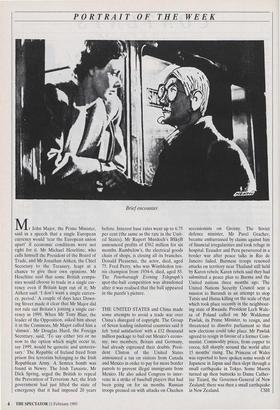PORTRAIT OF THE WEEK
Brief encounter.
Mr John Major, the Prime Minister, said in a speech that a single European currency would 'tear the European union apart' if economic conditions were not right for it. Mr Michael Heseltine, who calls himself the President of the Board of Trade, and Mr Jonathan Aitken, the Chief Secretary to the Treasury, leapt at a chance to give their own opinions. Mr Heseltine said that some British compa- nies would choose to trade in a single cur- rency even if Britain kept out of it; Mr Aitken said: 'I don't want a single curren- cy, period.' A couple of days later Down- ing Street made it clear that Mr Major did not rule out Britain's joining a single cur- rency in 1999. When Mr Tony Blair, the leader of the Opposition, asked him about it in the Commons, Mr Major called him a `dimwit'. Mr Douglas Hurd, the Foreign Secretary, said, 'To say either yes or no now to the option which might occur in, say 1999, would be quixotic and unneces- sary.' The Republic of Ireland freed from prison five terrorists belonging to the Irish Republican Army. A Semtex bomb was found in Newry. The Irish Tan aiste, Mr Dick Spring, urged the British to repeal the Prevention of Terrorism Act; the Irish government had just lifted the state of emergency that it had imposed 20 years before. Interest base rates went up to 6.75 per cent (the same as the rate in the Unit- ed States). Mr Rupert Murdoch's BSkyB announced profits of £562 million for six months. Rumbelow's, the electrical goods chain of shops, is closing all its branches. Donald Pleasence, the actor, died, aged 75. Fred Perry, who was Wimbledon ten- nis champion from 1934-6, died, aged 85. The Peterborough Evening Telegraph's spot-the-ball competition was abandoned after it was realised that the ball appeared in the puzzle's picture.
THE UNITED STATES and China made some attempts to avoid a trade war over China's disregard of copyright. The Group of Seven leading industrial countries said it felt 'total satisfaction' with a £32 thousand million package to bail out Mexico's econo- my; two members, Britain and Germany, had already expressed their doubts. Presi- dent Clinton of the United States announced a tax on visitors from Canada and Mexico in order to pay for more border patrols to prevent illegal immigrants from Mexico. He also asked Congress to inter- vene in a strike of baseball players that had been going on for six months. Russian troops pressed on with attacks on Chechen secessionists on, Grozny. The Soviet defence minister, Mr Pavel Grachev, became embarrassed by claims against him of financial irregularities and took refuge in hospital. Ecuador and Peru persevered in a border war after peace talks in Rio de Janeiro failed. Burmese troops renewed attacks on territory near Thailand still held by Karen rebels; Karen rebels said they had submitted a peace plan to Burma and the United nations three months ago. The United Nations Security Council sent a mission to Burundi in an attempt to stop Tutsis and Hutus killing on the scale of that which took place recently in the neighbour- ing state of Rwanda. President Lech Wale- sa of Poland called on Mr Waldemar Pawlak, its Prime Minister, to resign, and threatened to dissolve parliament so that new elections could take place. Mr Pawlak agreed to resign in favour of a former Com- munist. Commodity prices, from copper to cocoa, fell sharply around the world after 15 months' rising. The Princess of Wales was reported to have spoken some words of Japanese in Japan and then slept through a small earthquake in Tokyo. Some Maoris turned up their buttocks to Dame Cather- ine Tizard, the Governor-General of New Zealand; there was then a small earthquake


























































 Previous page
Previous page